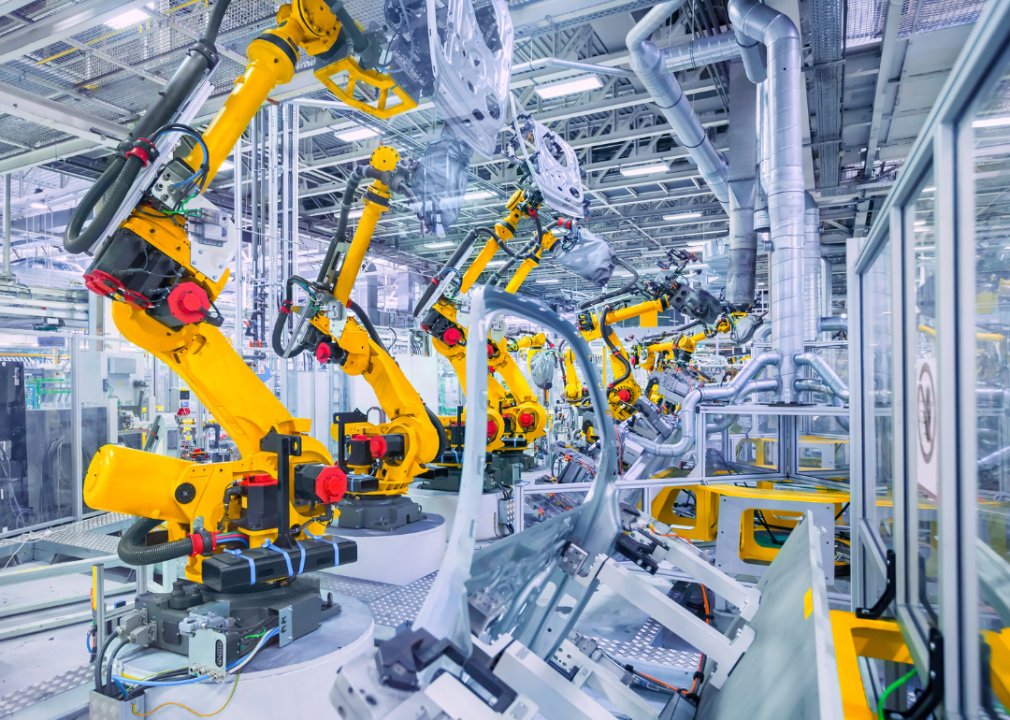5 of the top AI roles companies are seeking to hire

Canva
5 of the top AI roles companies are seeking to hire
Two software engineers writing on a clear board in an office.
In the latter half of the 20th century, TV watchers and moviegoers began to meet a long list of intelligent machines: “The Jetsons'” maid Rosie, B-9 from “Lost in Space,” HAL 9000 from “2001: A Space Odyssey,” the “Star Wars” saga’s C-3PO and R2-D2, and dozens more.
Science fiction laid out some of the basics of artificial intelligence for people, not only by presenting humanoid robotic characters, but also by explaining in dramatized ways the extent to which AI could influence human existence.
In the real world, AI is not a new concept either, even though the recent boom of applications such as ChatGPT might make it seem so. In the 1950s, a generation of mathematicians and scientists explored AI and its applications in human life. However, technology had not developed enough to pave the way for these AI pioneers to put their theories to the test.
In today’s era of big data, eight decades after Alan Turing conceptualized the idea of computers thinking and behaving like humans, AI is an intrinsic element of daily life—automating everyday tasks that otherwise consume large amounts of time. It has already increased efficiency and boosted performance in the banking, entertainment, technology, retail and marketing fields, among others, prompting the proliferation of jobs related to AI at all career levels in most industries.
Revelo looked at data from a 2022 McKinsey report to see which jobs were the top jobs in AI, examining only companies that have adopted AI in at least one function. The World Economic Forum projects that new jobs will arise and others will be ousted by the changes in tasks performed by humans and machines.
According to a PwC AI study cited by WEF, “any job losses from automation are likely to be broadly offset in the long run by new jobs created as a result of the larger and wealthier economy made possible by these new technologies.” It’s unclear how long that “long run” might be, but there are plenty of opportunities to get involved in the industry now.
The following analysis ranks jobs based on the percentage of companies that hired for each particular role. The data also looks at the same measurement, but only for “AI high-performers,” those companies that are industry leaders in AI.
![]()

Canva
#5. Data architects
A person standing with his back looking at the huge screen displaying data graphics.
– Share of companies who say they have hired for this role in the past year:
— 33% of AI high-performing companies
— 31% of all other companies
Combining computer science and design skills, data architects analyze the data framework of an organization to develop and improve database models. They store and organize company information so it can be easily retrieved when needed. Data architects must be knowledgeable in SQL and Oracle database management systems and data visualization software. Because AI initiatives require effective company-wide architecture, data architects are crucial to the success of AI projects.

Canva
#4. Machine learning engineers
Yellow robots in a car plant assembling a part of a car.
– Share of companies who say they have hired for this role in the past year:
— 58% of AI high-performing companies
— 27% of all other companies
Machine learning engineers create, develop, and test artificial intelligence programs, software, predictive models, and algorithms that help machines identify patterns and act autonomously. Their skillset must include scripting, programming, and data science and statistics expertise. These engineers are tasked with constantly improving the design of a company’s machine learning, which is very complex and increasingly in demand.

Canva
#3. AI data scientists
A digital illustration of strings of data on a green background.
– Share of companies who say they have hired for this role in the past year:
— 60% of AI high-performing companies
— 31% of all other companies
AI data scientists apply analytical and coding skills to examine data and gather the information needed to design custom-made solutions for organizations. They search for and present their findings and suggestions to stakeholders to help them make strategic, informed decisions. When they specialize in AI, data scientists feed information to programs to mimic and optimize existing processes while developing new strategies. Data scientists are in demand because, as AI technology continues to advance, the people in these roles help companies make smart decisions with data as well as automate business processes that improve efficiency and lower operational costs.

Canva
#2. Data engineers
A close up of a person’s face focused on the computer screen with lines of data.
– Share of companies who say they have hired for this role in the past year:
— 46% of AI high-performing companies
— 37% of all other companies
Building data channels to route information properly from various sources is the primary responsibility of data engineers. They consolidate, tidy up, and structure raw data to make it accessible and understandable for business analysts. Just as companies need data scientists to collect and analyze the data, they need data engineers to turn it into a collection that AI models can use.

Canva
#1. Software engineers
Two young software engineers are sitting at desks in a modern office, looking at large screens in front of them.
– Share of companies who say they have hired for this role in the past year:
— 42% of AI high-performing companies
— 40% of all other companies
Software engineers can choose from a wide range of career options; they can design and develop programs, such as computer games or network control systems. Their main duty is to generate and optimize business applications, which makes them highly sought-after tech professionals in most industries. Software engineers must have a strong knowledge of computer engineering and programming languages. AI companies utilize software engineers to not only build AI applications but also to maintain AI systems. Their insights are invaluable to the future of AI companies because the AI models they build help inform companies’ decisions.
Data reporting by Wade Zhou. Additional writing by Kelly Glass. Story editing by Jeff Inglis. Copy editing by Kristen Wegrzyn. Photo selection by Ania Antecka.
This story originally appeared on Revelo and was produced and
distributed in partnership with Stacker Studio.